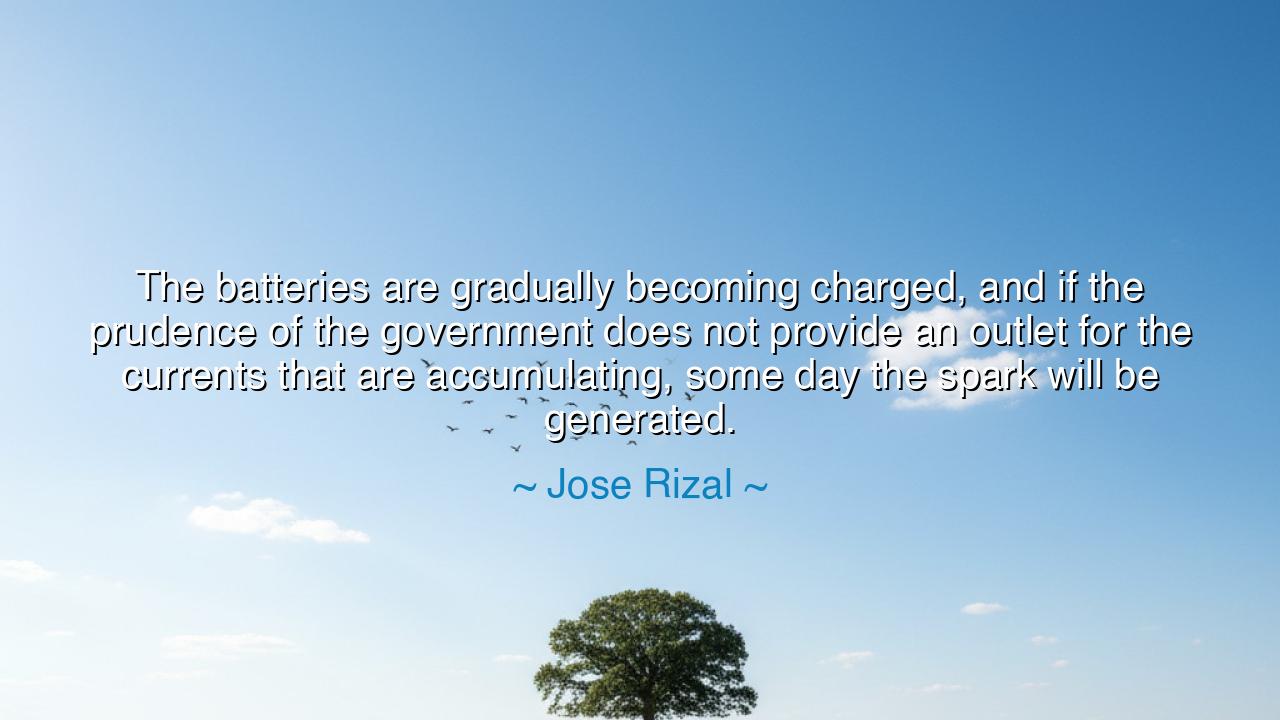
The batteries are gradually becoming charged, and if the prudence
The batteries are gradually becoming charged, and if the prudence of the government does not provide an outlet for the currents that are accumulating, some day the spark will be generated.






The words of José Rizal — “The batteries are gradually becoming charged, and if the prudence of the government does not provide an outlet for the currents that are accumulating, some day the spark will be generated.” — carry the force of prophecy. Spoken by one who loved his country yet saw its chains, they are both a warning and a revelation. Rizal, the national hero of the Philippines, was not merely a man of letters but a seer of revolutions. In these words, he spoke of a truth eternal to all nations — that oppression accumulates like storm clouds, that human suffering gathers energy, and that if rulers fail to give justice and freedom, the people will one day burst forth in revolution. What he called “currents” are not of metal or machine, but of human will, frustration, and hope, surging unseen beneath the surface of a silent society.
The quote finds its origin in Rizal’s writings during the late 19th century, a time when the Philippines groaned under Spanish colonial rule. The people were denied representation, education, and dignity, while their labor and faith were exploited. Rizal, though a man of peace and reason, felt the gathering pressure of change. He saw that injustice could not endure forever, that the people’s patience — long tested — would eventually reach its limit. In likening the nation to a battery slowly charging, he captured the inevitability of awakening: the more power is repressed, the greater the energy that will one day explode. It was not a call to violence, but a plea for wisdom — a warning to those in power that reform is the safety valve of revolution.
This image — of an electrical force building unseen — is a metaphor of great clarity and beauty. Rizal was both scientist and poet; he understood the natural world and the moral one as reflections of each other. A battery, when charged, holds potential energy. It can be harnessed for creation — to light the world — or it can erupt and destroy if denied an outlet. So too with nations: the power of the people, if guided by justice, can build civilization; if suppressed by tyranny, it will ignite the fires of revolt. His metaphor, though born in his century, speaks to every age. For no empire, no institution, no government has ever survived that refused to listen to the pulse of its people.
History bears witness to Rizal’s warning. Just a few years after his death — executed by the Spanish in 1896 for his writings and his defiance — the Philippine Revolution erupted. The “spark” he foretold became reality. The Filipino people, once humble and obedient, rose in fury and courage to claim their freedom. The “currents” he had spoken of — the pain of injustice, the hunger for liberty, the awakening of national consciousness — burst forth in fire and blood. Yet even then, Rizal’s spirit remained one of restraint and enlightenment. He had not desired destruction, but transformation. He believed that governments fall not because of rebellion alone, but because of their refusal to evolve with the needs of the governed.
The same principle can be seen in the revolutions of the wider world. The French Revolution began not in violence but in petition; the people sought fairness, not vengeance. Yet when kings ignored them, when greed and arrogance deafened the rulers’ ears, the energy of the oppressed became a torrent. In the American colonies, too, patient appeals for representation were denied until the “currents” of resentment and hope could no longer be contained. Every uprising in history is the echo of Rizal’s wisdom — when the energy of the people is denied expression, it will find its own.
But Rizal’s teaching is not only for rulers — it is also for the ruled. He believed that the people, like a charged battery, must also discipline their power. Energy without direction is chaos; freedom without virtue is ruin. The spark that ignites revolution must become the flame that illuminates, not consumes. Thus, even as he warned of the inevitable explosion of oppression, he also called for education, moral strength, and unity among his countrymen — so that when their time came, they would build a nation worthy of the suffering that birthed it. True power lies not in anger, but in awakened purpose.
So let this be the lesson handed down from Rizal to all generations: injustice cannot be contained forever. Whether in a nation, a community, or a human heart, the forces of truth and freedom, once awakened, will find release. The wise leader will listen before the storm, opening channels for peace, for dialogue, for reform. The wise citizen will nurture his power with knowledge and compassion, that his strength may heal, not harm.
And thus, O listener, remember this eternal law of history and of the soul: every silence carries the seed of a cry; every oppression stores the charge of liberation. When the currents of the people rise, the spark cannot be stopped — only guided. Let governments act with prudence, and citizens with wisdom, that the energy of justice may light the world, not set it aflame.






AAdministratorAdministrator
Welcome, honored guests. Please leave a comment, we will respond soon